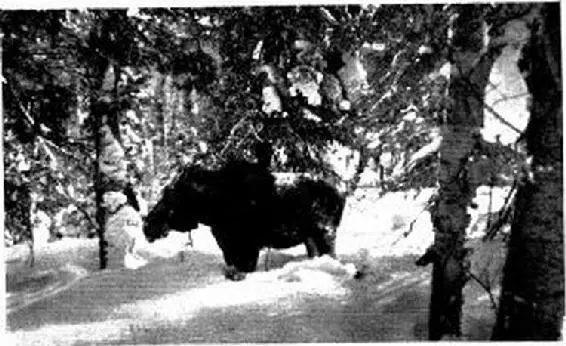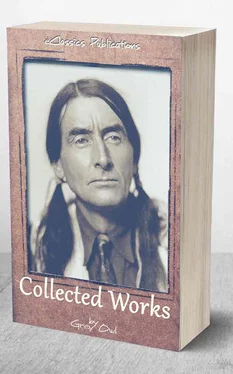The Trail, then, is not merely a connecting link between widely distant points, it becomes an idea, a symbol of self-sacrifice and deathless determination, an ideal to be lived up to, a creed from which none may falter. It obsesses a man to the utmost fibre of his being, the impelling force that drives him on to unrecorded feats, the uncompromising taskmaster whom none may gainsay; who quickens men's brains to shift, device, and stratagem, purging their bodies of sloth, and their minds of weak desires.
Stars paling in the East, breath that whistles through the nostrils like steam. Tug of the tump line, swing of the snowshoes; tracks in the snow, every one a story; hissing, slanting sheets of snow; swift rattle of snowshoes over an unseen trail in the dark. A strip of canvas, a long fire, and a roof of smoke. Silence.
Canoes gliding between palisades of rock. Teepees, smoke-dyed, on a smooth point amongst the red pines; inscrutable faces peering out. Two wooden crosses at a rapids. Dim trails. Tug of the tump line again: always. Old tea pails, worn snowshoes, hanging on limbs, their work is well done; throw them not down on the ground. Little fires by darkling streams. Slow wind of evening hovering in the tree tops, passing on to nowhere. Gay, caparisoned clouds moving in review, under the setting sun. Fading day. Pictures forming and fading in glowing embers. Voices in the running waters, calling, calling. The lone cry of a loon from an unseen lake. Peace, contentment. This is the Trail.
Tear down the tent and the shelter,
Stars pale for the breaking of day,
Far over the hills lies Canada,
Let us be on our way.
Trail Song.
CHAPTER FOUR – THE STILL-HUNT
"Deep in the jungle vast and dim,
That knew not a white man's feet,
I smelt the odour of sun-warmed fur,
Musky, savage and sweet."
Napoleon, so history informs us, said that an army travels on its stomach. He was right; Napoleon knew his stuff. More than that, this statement goes for Empires too, and the building of them, or any other line of human endeavour requiring a large expenditure of physical energy. The Bible itself is full of references as to how, when and where its people ate.
On the Frontier eating a meal is not the ceremonial affair of politely restrained appetite and dainty selection seen in the best hotels and restaurants, but an honest-to-God shovelling in of fuel at a stopping-place, to enable the machinery to complete its journey, or its task. There the food supply is the most important consideration, and starvation is not merely going hungry for a few days, but becomes a fatal proposition. Civilization will not let you starve; the wilderness will, and glad of the opportunity.
Flour, beans, lard, tea, and a certain amount of sugar, with salt pork, may be transported in sufficient quantities to suffice for all winter, in a single canoe, for a single man.
But meat seems to be the only food, modern opinion to the contrary notwithstanding, which will supply the amount of energy needed to meet the climatic conditions, and successfully to withstand the constant hardship, which are two of the main features of existence in some parts of Northern Canada, and as much so to-day as ever they were in the early days. Without it the whole line of the offensive against the powers of the great white silence would perceptibly weaken; and meat boiled, fried, dried, smoked, or just plain frozen, is what this thin line of attack is moving up on.
This does not condone the indiscriminate slaughter of moose, deer and other meat animals. Game protection is very strictly enforced in this country, and to-day the sportsman who comes out of the woods with his quota of trophies, while he leaves several hundred pounds of the best of meat to spoil in the woods, is counted guilty of a crime. The practice of supplying the crews of railroad construction and lumber camps with wild meat, fortunately not universal, is also to be much condemned. The companies, or contractors operating, are bearing the expense of boarding their crews, and the saving effected by the use of free meat is simply so much profit for the company, whose legitimate gains should not be so increased at the expense of the country, besides it does some honest tradesman out of his dues; and transportation facilities are no problem to this kind of pioneering.
It is no longer, as it was thirty years ago, a matter of seeing how much game one can kill to ascertain the number of different ways in which a stricken animal may hit the ground. Parts of this North country are swarming with game, but also, large areas of it are not. I have traversed regions a hundred miles in width where no track or other sign of animal life was to be seen save that of rabbits. The population of game animals, if evenly distributed, would not be as dense as it now appears to be, but there is enough meat in the North, in most places, to enable the pathfinders and the first fringe of scattering settlers, to live, and, if taken with discretion, not diminish the supply.
One sizeable moose will provide a man with meat for well over half the winter, and each settler family, with one moose per member, may, with due care, have the best of meat during all the cold months. With the coming of civilization and increased transportation facilities, hunting would no longer be necessary, and animals of all kinds could be preserved in perpetuity.
Pot-hunter is a term of reproach through all the length and breadth of the sporting world, as differentiating between the man who hunts for meat and the man who hunts for sport. But hunting to fill the pots of those families, who, as representatives of an entire people, are bravely struggling against adverse conditions and leading a life of deprivation and heavy labour, in their endeavour to bring some semblance of prosperity to a bleak and savage wilderness, is nothing to be held up to public scorn. These settlers and the trail-makers further afield are the people who are actually laying the foundation of an Empire overseas, subsisting for the most part on few enough of the necessaries of life; people to whom a large quantity of lard is as riches, and dried apples a luxury. Salt pork, which goes under the various euphonious titles of "Chicago Chicken," "Rattlesnake Pork" (on the supposition, based on the flavour, that the pigs it came from were fed on rattlesnakes), or just plain "sowbelly," whilst eatable to a hungry man, is no relish.
For these settlers to kill, subject to the liberal game laws of the different Provinces, an occasional moose to alleviate somewhat the monotony of beans and bannock to enable them to carry on cheerfully, is just as praiseworthy in principle as are the stupendous slaughters made by persons of high degree in Europe, where we may see recorded single bags of deer, bears and wild boars, large enough to keep an able-bodied pioneer family in meat for five years. It is understood that these huge piles of meat are given to the poor, to hospitals and other deserving institutions, which undoubtedly exonerates the men involved; so here, again, the much maligned pot gets in its nefarious work, without which such taking of animal life would be a shameful waste.

Moose, easily taken at water's edge when there is not
enough snow to impede progress, are hardly ever caught
by the camera after the freeze-up. A long careful still-hunt
preceded the taking of this picture.
In the North, the failure of the fall moose hunt is as much of a catastrophe as the blighting of a wheat crop would be in more organised areas. Pot-hunting it is truly; but sport? Yes; the greatest sport in the world; the meat hunt of the Makers of a Nation.
Читать дальше













